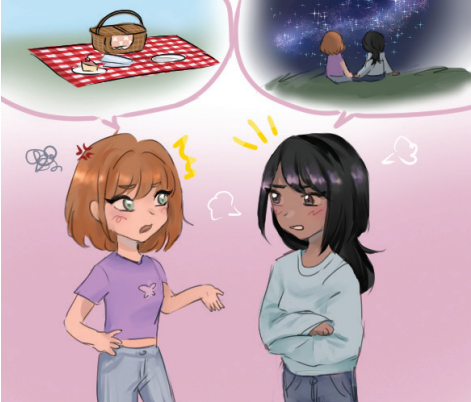By Raima Saha, Co-Design Editor
It is that time of year again. With Valentine’s Day on the horizon, movie production studios are churning out light-hearted romantic comedies to get people in the spirit of Cupid. Another gimmick to get you to believe in love and show you that, yes, it does still exist. It is all in good fun — until we think about the unintended, harmful impacts they have on our perception of love.
Think about it: these seemingly harmless movies set unrealistic expectations for love that are impossible to meet. A study conducted by the American Journal of Family Therapy found a correlation between romantic media consumption and relationship dissatisfaction, showing that viewers felt their current relationships weren’t meeting the standards of relationships portrayed on-screen.
Themes, such as “love conquers all” and “they know me better than I know myself,” are far-fetched and impractical. In the Netflix movie “Love in the Villa,” the two main characters, who live in different countries, fall in love when visiting Verona, Italy but do not discuss the logistics of what happens after, such as how their newly forged connection will survive across the span of continents and how their differing backgrounds will affect their relationship. Are we as viewers supposed to believe that love will conquer all, that no obstacle is too great for love to surpass? Audiences can not help but internalize these ideas when considering traits they value in a partner, contributing to sky-high expectations that no one can achieve which ultimately lead to heartbreak.
Rom-coms also portray harmful stereotypes that could hinder viewers from finding love. Most movies show romance between white, heterosexual people, which may convey that a person of color or someone who identifies as LGBTQ+ can not find love. While progress has been made with movies such as “To All The Boys I’ve Loved Before” and “Love, Simon,” they are few and far between for viewers of color or of differing sexual orientation.
Additionally, tropes such as the makeover send the wrong message. In the movie “He’s All That,” the Netflix spin-off of “She’s All That,” the romantic interest is othered and uncool, and they only become attractive once they have undergone a makeover. This conveys the notion that one must conform to certain societal standards to be considered desirable, and they can not be loved as they are. These implications can have detrimental effects on how people view their own relationships, contributing to dissatisfaction with their partner and their relationship.
Continuous pursuit, also known as disguised stalking, is yet another trope that Hollywood has painted as romantic and endearing. Julia Lippman of the University of Michigan found that people who watched romanticized versions of persistent pursuit were more likely to support “stalking myths,” statements that undermined stalking as a real crime. Though not considered a comedy, the widely popular romance movie “Twilight” shows vampire Edward coming into Bella’s bedroom window and watching her sleep. These mixed messages confuse viewers with harmful ideas of romance, potentially putting them in danger and skewing their perspectives of a healthy relationship.
However, many argue that rom-coms are not meant to be over-analyzed. It is a genre that one can watch after a long, taxing day that doesn’t desensitize you to the realities of life. While they may appear to be providing escape, they create more problems than they solve. One is more likely to fall for these idealistic relationships unknowingly and set them as their bar, something that is far more dangerous than rom-coms themselves.
So go out and celebrate Valentine’s Day, whether that’s with someone special, by yourself or with a group of friends. And if you do happen to watch a rom-com, make sure you don’t fall prey to their half-baked truths of romance.
Raima Saha can be reached at [email protected].






















































































